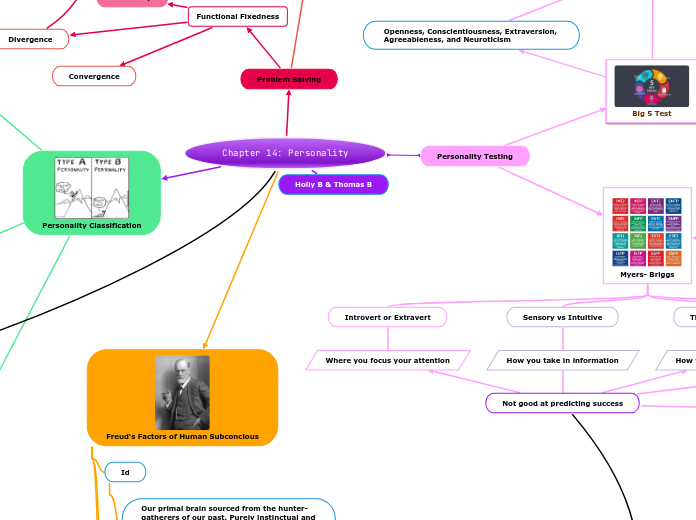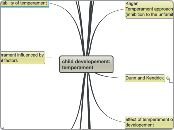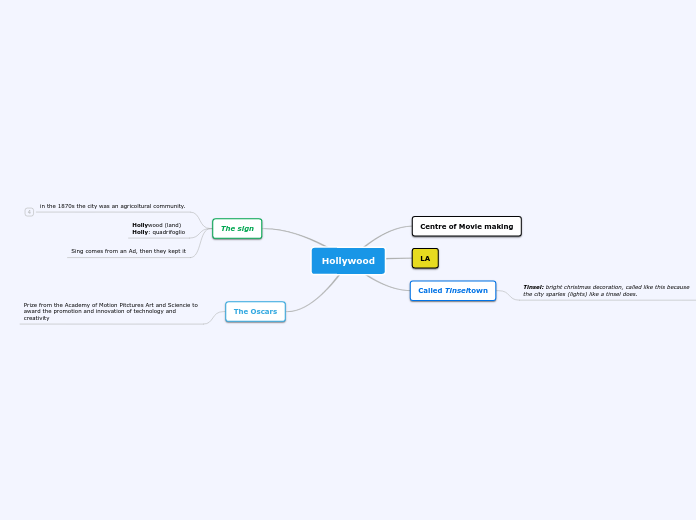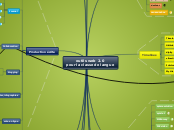Divergence
Convergence
4. Solutions tried and results evaluated
Functional Fixedness
Creativity
"Name as many things as you can with wheels"
1. Flexibility - how many categories
2. Fluency - How many answers
3. Originality - did anyone else come up with the same answer
4. Elaboration - does it require explanation
Thinking "outside of the box"
2. Potential solutions generated
3. Solutions evaluated
Often considered antiquated due to its questionably racist origins and new research into intellect and its inherent multifactededness
More accurate
Less accurate
Personality Testing
Chapter 14: Personality
Holly B & Thomas B
Freud's Factors of Human Subconcious
Superego
The idealized version of an individual's personality - the segment that manages the ego's behavior and forms complex moral standpoints and beliefs.
Ego
The ego acts as a center point between the superego and the id, controlling the Id's animalistic urges to make them more acceptable to the world while also stopping the superego from completely repressing the urges.
Id
Our primal brain sourced from the hunter-gatherers of our past. Purely instinctual and societally unacceptable in the current day, but important for survival nonetheless. Regulated by the superego and its direct opposite.
Problem Solving
4 Stages
1. Problem identified
Personality Classification
Growth vs Fixed Mindset
Fixed Mindset: Lacks initiative or confidence to make improvements. Essentially the doomer mindset - setbacks often can feel like the end of the world, like the person is in question is in quicksand and can't get out.
Growth Mindset: A willingness to take failure and turn it into success - exhibits an active desire to improve. Generally sees improvements, even when failure occurs.
Growth mindsets help improve productivity and mood
IQ and EQ
EQ: Tested through various personality tests and evaluations. Score of the test taker's ability to understand other people's emotions and interact with social situations in positive ways.
Numerically quantifying systems are limited and do not provide reliable way to determine intellect and success.
IQ: Quantified through standardized testing. Score of the test taker's affinity for spatial awareness, math, and analytics.
Type A vs Type B
Type B: Relaxed, steady-headed, creative. Tend to gain satisfaction from tasks involving creativity and abstract thinking. Generally laid-back and less engaged with mathematics and similar topics than type A personalities.
Type A: Anal, attentive, work-minded. Tend to prioritize hard work and gain satisfaction from accomplishing tasks that require logical thinking.
Very general and not applicable to all people. Actual humans may lean to one personality type other but the classifications are far to general to provide any concrete psychological evaluation or predict success.
Big 5 Test
Not defined personality "types", but more broad personality groups that form a gradient between people
Often considered the most accurate
and diverse form of personality testing currently available
Openness, Conscientiousness, Extraversion, Agreeableness, and Neuroticism
Myers- Briggs
Judging vs Perceiving
How you structure yourself in the world
Thinker vs Feeler
How you make decisions
Sensory vs Intuitive
How you take in information
Not good at predicting success
Introvert or Extravert
Where you focus your attention









